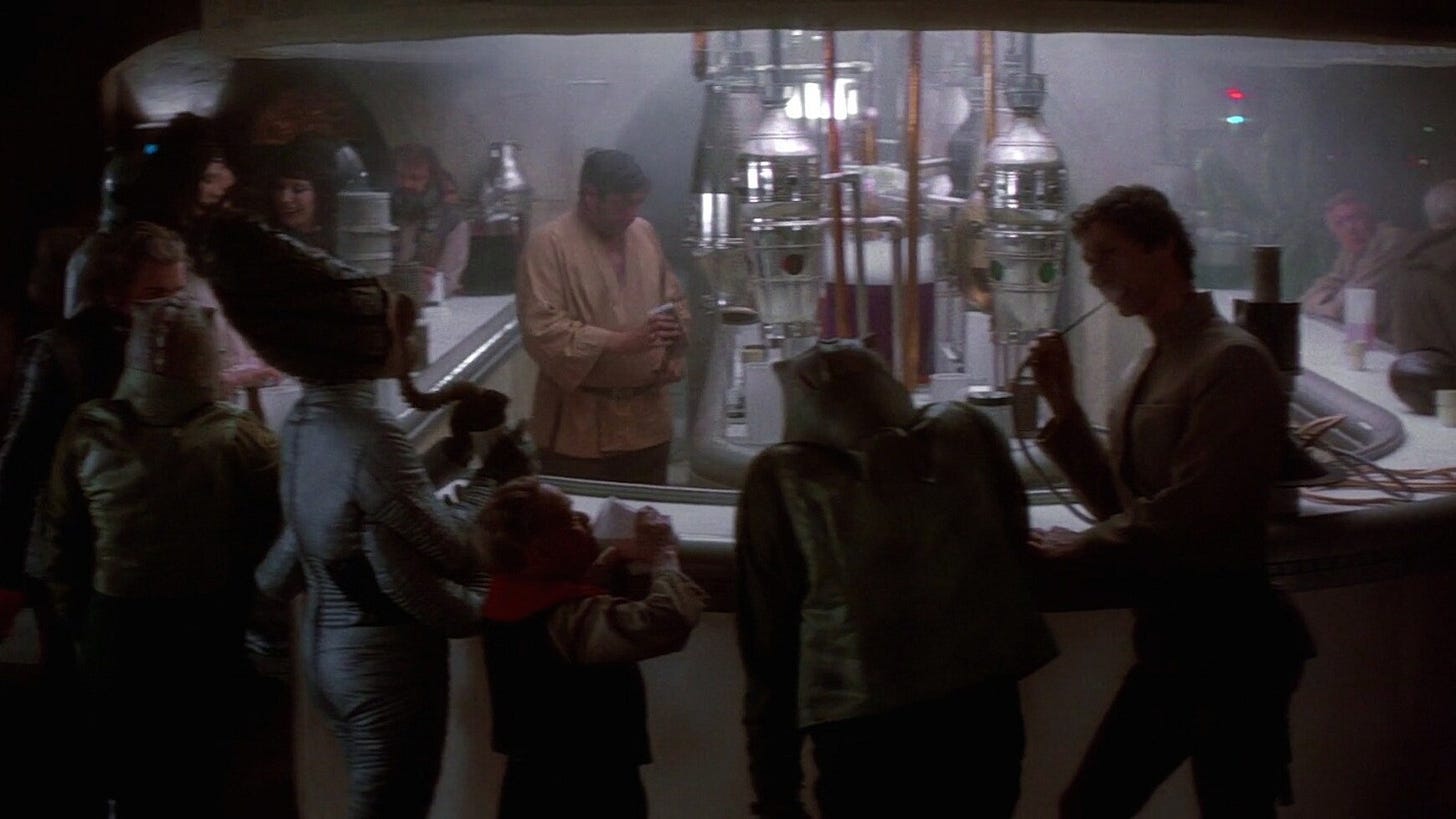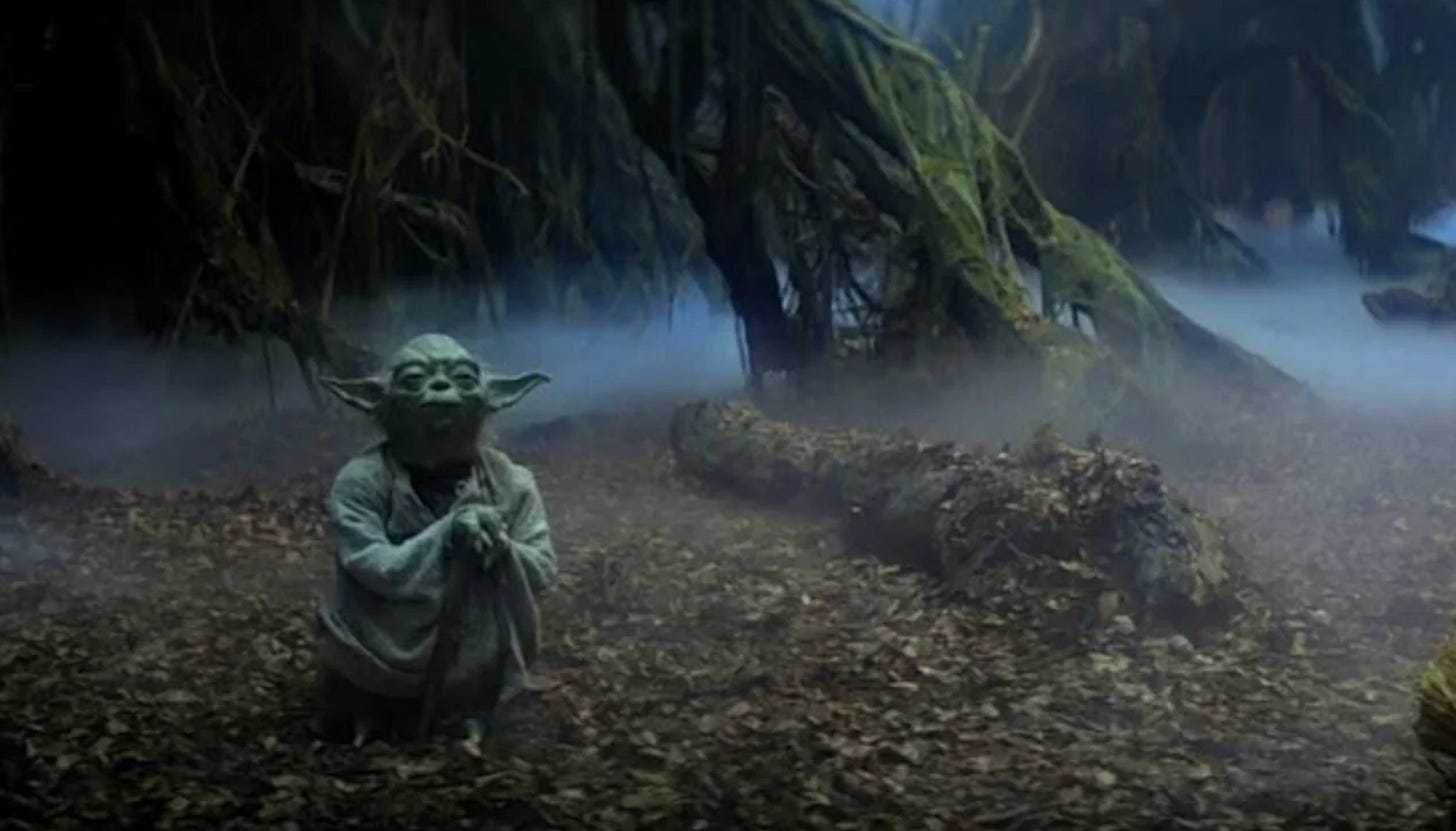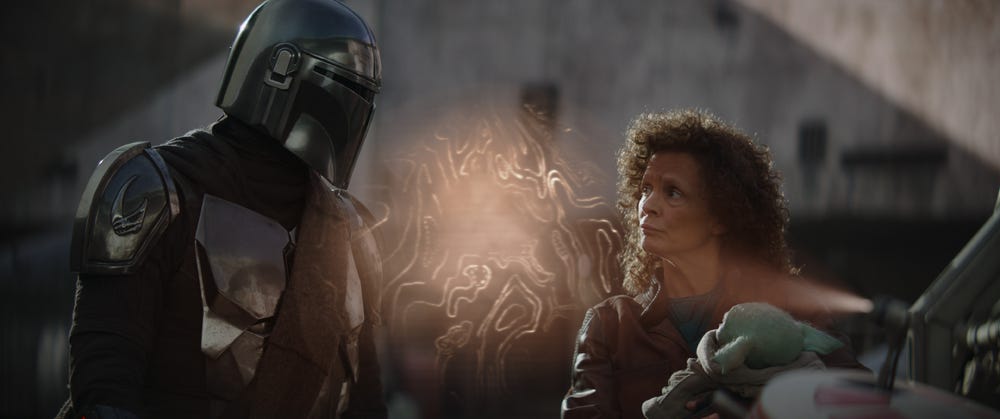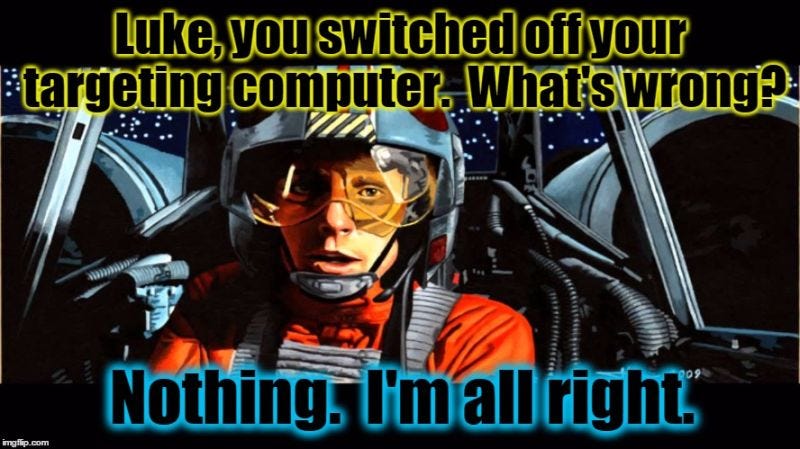The Star Wars Future We’re Building
Our future might resemble Star Wars' Tatooine more than Star Trek's Federation.
Full Stack Founder AI Bootcamp 29-30 Sep, London. Discount code EVGENY100. Tickets.
The café door recognises I’m considering entering1 and begins negotiating with my phone about my usual order. The espresso machine has opinions about extraction temperature that conflict with the grinder’s particle-size preferences. They’re having what amounts to a theological debate, mediated by a scheduling algorithm that’s optimising foot traffic.
The tattooed barista stands between them like a tired translator who speaks both languages poorly but somehow makes it work. She touches the machine with her left hand, makes a sign with her right that might be code, might be prayer.
The gesture is half programming, half superstition.
The coffee tastes great. No one knows why.
Across the street, a bar still uses a cash register from 1987. Their coffee is better.
This is ten years from now, and it’s already here.

When I imagine AI future, it feels like Star Wars. Not Star Trek’s clean Federation where technology solved everything, but something messier: Mos Eisley as civilisation. There, species breathing different atmospheres make music together. No one questions the impossibility. A moisture farmer haggles over droids that could calculate hyperspace jumps but will harvest water from desert air. Someone uses a lightsaber to slice bread.2
This is where we are. Godlike AI systems process humanity’s knowledge in microseconds while someone can’t make a printer work. A teenager in Jakarta bankrupts a corporation with an AI swarm she trained in her bedroom. The company’s chatbots couldn’t remember what they’d promised customers yesterday.
There’s no meritocracy here, no logic, just distribution of power as random as the Force. What matters is how every device on the planet recognises you, what tier of reality you’ve been sorted into. The invisible empires built on attention and prediction don’t follow national borders. They create their own geography.
We tell ourselves we’re fighting the final battles. Left versus right. Doomers versus accelerationists. Privacy versus transparency. Democracy versus authoritarianism. As if one vision will win and stay forever.
But these aren’t final battles. They’re eternal ones, and the future doesn’t wait for their resolution. The world grows through the cracks between competing visions, weird and contradictory and impossible to map.
The future won’t arrive through victory. It will accumulate through accident.

George Lucas stitched together samurai films and westerns and old science fiction to create Star Wars. The inconsistencies became mythology. Our AI future builds the same way: brilliant innovations atop legacy code no one understands, digital gods sharing space with analog hermits, each contradiction somehow making sense.
Some choose to want nothing in a world that can fulfil any desire. They cultivate emptiness as a discipline. The rest of us struggle to honour our humanness but not so much we’re consumed by our craving. Attention becomes the only real currency: whether you can rest your gaze without algorithms capturing it, whether you can look away.
Some retreat entirely, building rituals around older technologies. Some merge until they’re mostly machine, gaining capability while losing something subtle. Most live between extremes, using tools we don’t understand for tasks we can’t quite explain.
Like Yoda in his swamp, the wise choose minimal engagement, maintaining power through what they don’t do. The Force, the AI itself, the infrastructure of intelligence mediating between thought and matter, serves those who learn its rhythms, consumes those who try to dominate it — much like nature.3
What makes us human isn’t intelligence. Machines have that. It isn’t strength. Machines have that too.
It’s this: we recognise each other’s consciousness. We feel. We know when someone else feels. This knowledge transcends every augmentation, every enhancement, every algorithmic mediation. In the future’s noise, we hunger for the friend who forgets our birthday but feels our sadness; we choose them over perfect AI companions who remember everything but don’t have a soul.
We will never prefer a robot to hold our hand on the deathbed if a compassionate human could be with us instead.
Our humanity lives in the irreducible fact of feeling, of being a living being among living beings, of preferring a human connection despite its inefficiency.

Back in the cafe, the barista’s gesture stays with me. Half programming, half superstition. Neither fully human nor fully machine. A improvisation that works until it doesn’t, until it does again.
The future won’t have a conclusion. Like Star Wars, it will just keep going, adding layers and contradictions, rewriting its own history, spawning endless variations.
The coffee tastes perfect. No one can explain why.
Our AI future is neither a triumph, not an apocalypse, but something wonderfully, terrifyingly incoherent. A space opera without a script where the only skill that matters is accepting the impossible with grace.
This essay was co-written by me and Claude (Opus 4.1). Claude helped me to capture my core idea of sensing a link between Star Wars and how I expect our future to look like, and weave my other thoughts into the narrative. Writing this by hand would have been faster, but also very different. Let’s consider this an experiment.
We might have to wait a few years for lightsabers, but for now we can satisfy ourselves with ultrasonic knives. Yep, for real. Why? 🤷♂️
The only mdash (—) in this essay was added by me, not AI.


